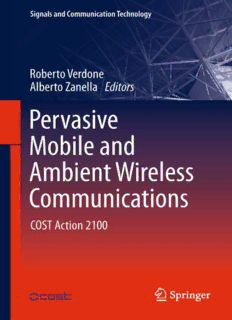Table Of ContentSIGNALSANDCOMMUNICATIONTECHNOLOGY
Forfurthervolumes:
www.springer.com/series/4748
Roberto Verdone (cid:2) Alberto Zanella
Editors
Pervasive
Mobile and
Ambient Wireless
Communications
COST Action 2100
Editors
RobertoVerdone AlbertoZanella
Dip.diElettronica,InformaticaeSist. IEIIT
UniversitàdiBologna NationalResearchCouncilofItaly(CNR)
Bologna Bologna
Italy Italy
ISSN1860-4862 SignalsandCommunicationTechnology
ISBN978-1-4471-2314-9 e-ISBN978-1-4471-2315-6
DOI10.1007/978-1-4471-2315-6
SpringerLondonDordrechtHeidelbergNewYork
BritishLibraryCataloguinginPublicationData
AcataloguerecordforthisbookisavailablefromtheBritishLibrary
LibraryofCongressControlNumber:2011944421
©Springer-VerlagLondonLimited2012
Apartfromanyfairdealingforthepurposesofresearchorprivatestudy,orcriticismorreview,asper-
mittedundertheCopyright,DesignsandPatentsAct1988,thispublicationmayonlybereproduced,
storedortransmitted,inanyformorbyanymeans,withthepriorpermissioninwritingofthepublish-
ers,orinthecaseofreprographicreproductioninaccordancewiththetermsoflicensesissuedbythe
CopyrightLicensingAgency.Enquiriesconcerningreproductionoutsidethosetermsshouldbesentto
thepublishers.
Theuseofregisterednames,trademarks,etc.,inthispublicationdoesnotimply,evenintheabsenceofa
specificstatement,thatsuchnamesareexemptfromtherelevantlawsandregulationsandthereforefree
forgeneraluse.
Thepublishermakesnorepresentation,expressorimplied,withregardtotheaccuracyoftheinformation
containedinthisbookandcannotacceptanylegalresponsibilityorliabilityforanyerrorsoromissions
thatmaybemade.
Printedonacid-freepaper
SpringerispartofSpringerScience+BusinessMedia(www.springer.com)
COST
COST, the acronym for European Cooperation in Science and Technology, is the
oldestandwidestEuropeanintergovernmentalnetworkforcooperationinresearch.
Established by the Ministerial Conference in November 1971, COST is presently
used bythe scientificcommunitiesof 35European countriesto cooperatein com-
monresearchprojectssupportedbynationalfunds.
ThefundsprovidedbyCOST—lessthan1%ofthetotalvalueoftheprojects—
supporttheCOSTcooperationnetworks(COSTActions)throughwhich,withEUR
30millionperyear,morethan30,000Europeanscientistsareinvolvedinresearch
having a total value which exceeds EUR 2 billion per year. This is the financial
worthoftheEuropeanaddedvaluewhichCOSTachieves.
A“bottomupapproach”(theinitiativeoflaunchingaCOSTActioncomesfrom
the European scientists themselves), “à la carte participation” (only countries in-
terested in the Action participate), “equality of access” (participation is open also
to the scientific communities of countries not belonging to the European Union)
and“flexiblestructure”(easyimplementationandlightmanagementoftheresearch
initiatives)arethemaincharacteristicsofCOST.
AsprecursorofadvancedmultidisciplinaryresearchCOSThasaveryimportant
rolefortherealisationoftheEuropeanResearchArea(ERA)anticipatingandcom-
plementing the activities of the Framework Programmes, constituting a “bridge”
towards the scientific communities of emerging countries, increasing the mobil-
ity of researchers across Europe and fostering the establishment of “Networks of
Excellence” in many key scientific domains such as: Biomedicine and Molecular
Biosciences;FoodandAgriculture;Forests,theirProductsandServices;Materials,
Physical and Nanosciences;Chemistry and MolecularSciences and Technologies;
Earth System Science and Environmental Management;Information and Commu-
nication Technologies; Transport and Urban Development; Individuals, Societies,
Cultures and Health.It covers basic and more appliedresearch and also addresses
issuesofpre-normativenatureorofsocietalimportance.
Web:http://www.cost.eu
v
vi COST
ESFprovidestheCOSTofficethroughanECcontract
COSTissupportedbytheEURTDFrameworkprogramme
The COST 2100 Action was supported by the COST framework
fromDecember2006toDecember2010
Foreword
COST(standingforEuropeanCOoperationinthefieldofScientificandTechnical
research)ActionsinthefieldofWirelessCommunicationsstartedfromAction207
Digital Land Mobile Communications, which clarified several open technological
issuesinGlobalSystemforMobileCommunications(GSM)’sspecification.COST
207alsopavedthewaytosuccessfulfollowers,suchasCOST231,259,273,and,
finally,2100,allcharacterisedbylowcost,excellentachievementsandopennessin
disseminatingtheresults.
The scope of COST 2100 has been together broad and ambitious, yet, judging
fromthisbookandmylateralexperienceasDirectorofNEWCOM++,anetworkof
excellenceinwirelesscommunicationsthatcooperatedwithCOST2100,hasbeen
largelyachieved.
Followingthe1971statementbyWeldon“codingisdead”,whichprovedtobe
totallywronginthefollowing40years,arecentpaper1 raisedthequestion“Isthe
PHY layer dead?”. The authors of the paper argue that “disconnection between
academia and industry has increased the perception of the morbidity of the PHY.
Academicslargelyjudgethemselvesbythetheorydevelopedintheirpapers,...in-
dustryisjudgedbythestockmarketonitsabilitytoturnaprofit.”Thisbookoffers
thetangibleevidenceofwhatcanbedonetoreversewhatIalsoconsideranegative
trend. The main flavour of this book stems from two main characteristics: a deep,
unusualinthesedays,collaborationbetweenacademiaandindustryand,asacon-
sequence,aconstantattentiontomaintainadifficultequilibriumbetweenrigorous
theoryandpracticalconstraints.
In its pages, it shows how that convinced cooperation in the area of Wireless
CommunicationsNetworks(WCN)betweenmajorEuropean(andbeyond)players
inacademiaandindustrycanleadtoresultsofinterestforbothcommunities.
Intodayworld,acommonfeatureofthemainproblemsthemankindhastoface
is complexity. Science and technology, in WCN in particular, are no exception to
thisrule.Overlystressedsimplifications,betheminthemodellingofthechannelor
1M.Dohler,R.H.Heath,A.Lozano,C.B.Papadias,R.A.Valenzuela.IsthePHYlayerdead?IEEE
Comm.Magazine,vol.49,n.4,pp.159–165,2011.
vii
viii Foreword
transmitter/receiverelements,mayleadtoelegantresultsformulationbutquiteoften
failtocapturetherealessenceoftheproblemandtoofferapracticalsolution.On
theotherhand,industryshouldvaluemorethequestofrigourofacademiaandpush
theinteractiontoprovidemoreinsightintophysicalimpairmentsofthechanneland
thehardware,aimingatabettermodellingandmorerefinedtheory.
PartIofthisbookprovidesanexcellentexampleofhowtheacademia/industry
cooperation can advance the knowledge of the physical medium (including anten-
nae)throughajointeffortinvolvingmeasurement,modellingandtesting.Thewidth
anddepthoftheresultsmakethemafundamentaltoolfor4Gstandardisationbod-
ies.
Almostallthechallengesinpoint-to-pointcommunicationshavebeenaddressed
and solved: the Shannon capacity limits, practical ways to approach them using
turbo or low-densityparity-checkcodes, evenconstructiveproofs that they can be
attained in some case (polar codes), large increase in spectral efficiency through
spatialmultiplexingwithMIMO.
Movingtoamultipointmultiuserparadigmmakesthestorymuchdifferentand
offers many opportunity of open theoretical and practical problems to researchers
andengineers,likecooperationindistributedsystemsthroughrelayingandnetwork
coding, efficient strategies for resource management. These issue are effectively
addressedinPartsIIandIIIofthebook,againastheresultofanevidentcooperation
betweenacademiaandindustry.
Inthefourthandlastpart,thebookmovesonestepfurtherinthepracticalrealm
by applying the previous results to a few system scenarios, like mobile-to-mobile
andbody-areacommunications.
Whilewishingtoallthereadersanenjoyablejourneythroughthisbook,reading
thePrefaceofRobertoVerdone,theChairpersonofCOST2100,Ilookforwardto
seethefuturebookthatwillsummarisetheresultsofthenextCOSTactionentitled
“CooperativeRadioCommunicationsforGreenSmartEnvironments”!
Torino,Italy SergioBenedetto
FullProfessor,NEWCOM++Director
Preface
This book contains most of the scientific results achieved within the framework
of the European Cooperation in Science and Technology (COST) Action 2100 ti-
tled “Pervasive Mobile and Ambient Wireless Communications”. The Action (see
www.cost2100.orgfordetails)waslaunchedinDecember2006andfinishedinDe-
cember 2010. Nearly 600 researchers affiliated to 142 research institutions (Uni-
versities,industriesandresearchcentres)from35countrieswereactiveattheend
of the project; while most of them were from Europe, companies like Motorola,
AzimuthSystems,NTTDocomoandothers,wereparticipatingfromNorthAmer-
icaandAsia.Theseresearcherspresentedanddiscussed880scientificarticlesdur-
ing the 12 meetings held within four years of activity. This book summarises and
presentsunderacoherentviewthecontentsofalargepartofthem;thoseaddress-
ingthescientifictopicswhichattractedmoreinterestduringthefouryearsbrought
tolargerinternationalvisibilitytheactivitiesoftheActionbecauseofthescientific
relevanceoftheresearchersinvolvedandthetopics.
TheCOSTAction2100inheritedfromthepreviousActionsonmobileandwire-
lesscommunications(COST207,231,259,273)manythings:amongthese,astrong
spiritofcooperation,averylargecriticalmassofresearchersandinstitutions,adeep
interactionbetweenacademiaandindustry.
The spirit of cooperation is the engine which allowed the achievement of re-
sultsthatasingleresearchinstitutioncannotreach:thebookchaptersdedicatedto
theradiochannelpresentmodelsbasedontheeffortofmanyresearchers,integrat-
ingdifferent viewsandbackgrounds;someof thesechaptersreport measurements
whichwereachievedthroughjointcampaigns.
The critical mass around some specific topics, like MIMO or Radio Resource
Managementof4Gnetworks,allowedthedeterminationofconcertedviewsandthe
achievement of results of interest to a wide community of researchers; also, this
permittedthecreationofworkinggroupsaddressingsomespecifictopics,likebody
communications,ofinnovativenature.
Thestronginteractionbetweenacademiaandindustrymadesomeoftheworking
groups, like the one dealing with Over-The-Air antenna test methods, a reference
pointforthescientificworld,abletointeractanddeterminethechoicesmadewithin
standardisationbodieslike3GPP.
ix
Description:Pervasive Mobile and Ambient Wireless Communications reports the findings of COST 2100, a project of the European intergovernmental COST framework addressing various topics currently emerging in mobile and wireless communications. Drawing on experience developed in this and earlier COST projects, th

